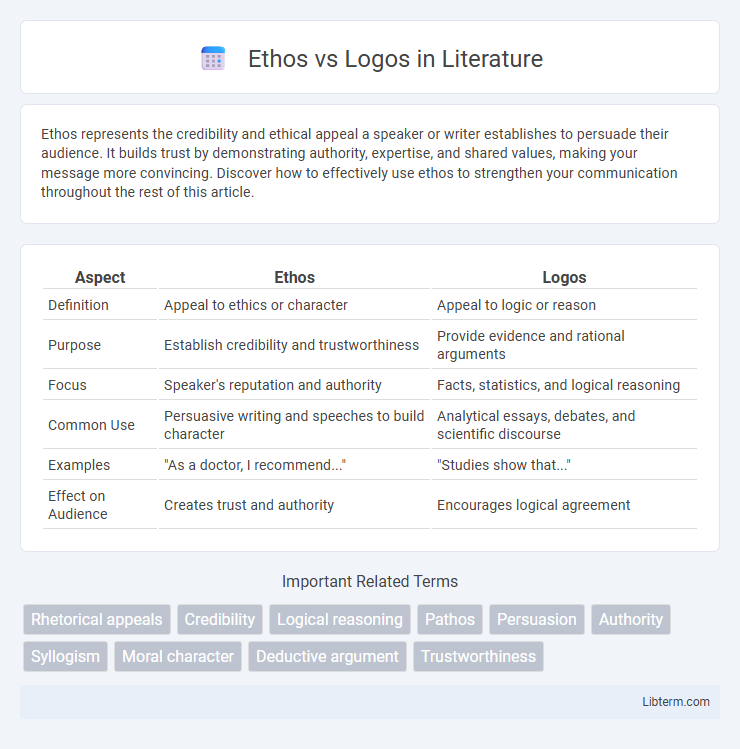Ethos represents the credibility and ethical appeal a speaker or writer establishes to persuade their audience. It builds trust by demonstrating authority, expertise, and shared values, making your message more convincing. Discover how to effectively use ethos to strengthen your communication throughout the rest of this article.
Table of Comparison
| Aspect | Ethos | Logos |
|---|---|---|
| Definition | Appeal to ethics or character | Appeal to logic or reason |
| Purpose | Establish credibility and trustworthiness | Provide evidence and rational arguments |
| Focus | Speaker's reputation and authority | Facts, statistics, and logical reasoning |
| Common Use | Persuasive writing and speeches to build character | Analytical essays, debates, and scientific discourse |
| Examples | "As a doctor, I recommend..." | "Studies show that..." |
| Effect on Audience | Creates trust and authority | Encourages logical agreement |
Understanding Ethos and Logos
Ethos and logos are foundational rhetorical appeals used to persuade an audience, with ethos emphasizing the speaker's credibility and ethical character, and logos focusing on logical reasoning and evidence. Effective use of ethos requires establishing trustworthiness, authority, and moral integrity, often through demonstrating expertise and goodwill. Logos relies on clear arguments supported by data, facts, statistics, and rational analysis to appeal to the audience's intellect and critical thinking.
Defining Ethos: The Power of Credibility
Ethos represents the appeal to credibility, where the speaker establishes trustworthiness and authority to persuade the audience effectively. Demonstrating expertise, ethical character, and reliability strengthens the speaker's ethos, making arguments more convincing. This powerful rhetorical strategy anchors persuasion in the perceived integrity and competence of the communicator.
What Is Logos? Logic in Persuasion
Logos, or logical appeal, relies on reasoning and evidence to persuade an audience by presenting clear facts, statistics, and rational arguments. It emphasizes consistency, coherence, and valid inferences to strengthen claims and convince through intellectual engagement. Effective use of logos ensures the argument is grounded in objective truth and structured analysis, appealing to the audience's sense of logic.
Ethos vs Logos: Core Differences
Ethos appeals to the speaker's credibility and character, establishing trustworthiness to persuade the audience, while Logos relies on logical reasoning, evidence, and facts to support an argument. Ethos emphasizes ethical appeal and authority, making the speaker appear credible and reliable, whereas Logos prioritizes clear, rational arguments based on data and statistics. The core difference lies in Ethos building persuasion through the speaker's reputation, whereas Logos depends on the strength of logical evidence.
Building Ethos in Argumentation
Building ethos in argumentation involves establishing the speaker's credibility, character, and trustworthiness to persuade the audience effectively. Demonstrating expertise through accurate facts, ethical behavior, and confident delivery enhances the speaker's ethos, making the argument more convincing. Strong ethos appeals to the audience's sense of integrity and reliability, fostering a deeper connection and increasing the likelihood of acceptance.
Harnessing Logos for Logical Appeal
Harnessing logos for logical appeal involves using clear evidence, statistics, and rational arguments to persuade an audience based on reason. Effective logos relies on structured reasoning, presenting facts and data that support claims in a coherent, convincing manner. This approach strengthens credibility by appealing directly to the audience's intellect and reducing emotional bias.
Ethos and Logos in Classic Rhetoric
Ethos and Logos are fundamental pillars of Classic Rhetoric, where Ethos establishes the speaker's credibility and moral character to persuade the audience effectively. Logos appeals to logic and reason, using evidence, facts, and rational arguments to support claims and convince listeners. In Aristotelian rhetoric, the balance of Ethos and Logos enhances the persuasiveness of speeches by combining trustworthiness with logical coherence.
Real-World Examples of Ethos and Logos
Ethos is demonstrated by figures like Martin Luther King Jr., who built credibility through his moral authority and commitment to civil rights, enhancing the persuasive power of his speeches. Logos is evident in scientific research presentations where data, statistics, and logical reasoning are used to support hypotheses, such as climate change reports by the Intergovernmental Panel on Climate Change (IPCC). In advertising, ethos appeals appear when brands emphasize expert endorsements, whereas logos appears through factual product information and cost-benefit analyses.
When to Use Ethos vs Logos
Use ethos when establishing credibility or trust is essential, especially in professional or ethical arguments where the speaker's authority influences audience acceptance. Logos is most effective when presenting logical evidence, statistics, or rational arguments that require analytical thinking and fact-based persuasion. Choose ethos to appeal to character and shared values, and logos to appeal to reason and objective proof.
Balancing Ethos and Logos for Effective Communication
Balancing ethos and logos is crucial for effective communication, as ethos establishes the speaker's credibility while logos appeals to the audience's logical reasoning. Combining authoritative sources, expert testimonials, and sound evidence enhances persuasive impact by fostering trust and clear understanding. Effective communicators strategically integrate ethos and logos to motivate action and validate their arguments through both ethical appeal and rational evidence.
Ethos Infographic

 libterm.com
libterm.com